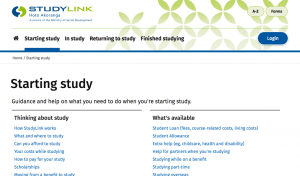Sorry, Jessie J, but – this week – it’s all about the money.
Finances at university can be a huge source of stress for a lot of first-years (myself included), so I thought I’d take the time today to talk about different options you have regarding said finances when you get to university, and even before the fact. We’re talkin’ scholarships, StudyLink, secondhand books (seen in the vid above), and… part time jobs. (The alliteration got away from me at the end there.)
Scholarships
This section could almost be split into three subheadings – University of Auckland scholarships, external/independent scholarships, and NZQA Scholarship exams. UoA offers a great deal of schollies for first-years, with differing values, if only you know where to look. (In this case, I’ve done the work for you. Here’s a link to info about general school-leaver and first-year scholarships, and here’s a link to a cheeky search I did for entry-level scholarships in different faculties.) Applications for these close between August and October, so make sure you get on that if you’re so inclined! However, UoA isn’t the only place to look for scholarships – there are loads of companies or trusts that offer them and these are usually to be found either through your secondary school or with a trusty little Google search. I can’t help you out much there, but these scholarships can be invaluable if you get onto them because often the pool isn’t as large (obviously this is dependant on what you’re going for) – which means you’re in with a better chance! Another scholarship option that you’re likely more familiar with is NZQA Scholarship exams. These rely on your school facilitating them, but they’re a good option to consider if you’re strong academically and can put in the effort to study for more exams at the end of the year. (For more on scholarships, head over to Sonna’s blog post – she covered it in much more depth than I have here!)
StudyLink
If you’re anything like I was at this point last year, you’ll see the words “student loan” and want to scream, cry, and run for the hills. However, student loans are interest-free at the moment, so they’re actually not as scary an option as one might think – and they’re a reality for most, if not all, students. How much of a loan you take out is a personal preference, but there’s an upper limit, so be strategic and keep your eye on EFTS! (But don’t be afraid of taking out a student loan. You can get a part-time job and pay part of it towards your student loan as you’re studying so that you’re chipping away at the “crippling student debt” that people are always talking about. Hint: it’s not as crippling if you’re on top of things and know what you’re doing with it.) But student loans aren’t the only thing you can get through StudyLink! Depending on your parents’ income, you may be eligible for a student allowance, and you can also click here for some information on course-related costs. University is expensive, and there’s absolutely no shame in taking assistance where you need it.
Employment
Part-time jobs are surprisingly easy to find in the Bright Lights, Big City – you’ve just got to look for them. One pro tip would be to keep tabs on the social media profiles of businesses you’re a big fan of – everything from massive cultural landmarks to tiny Newmarket eateries, because oftentimes job vacancies will be advertised on Instagram or somewhere similar. What I like about my current job is that the hours are flexible, because it means I can adjust my work schedule according to what the rest of my life is doing, which makes me a very happy camper indeed. But getting a part-time job while at university can be a great step to take because –
- you’ll be earning money, which you can
- put into a KiwiSaver account or use to pay off your student loan
- use to buy whatever you want/need snacks- or concert-wise
- spend instead of spending money you’d saved for necessities (to continue previous point)
- part-time jobs can turn into full-time jobs over summer if you play your cards right
Plus, a few hours a week at work is really nothing when you consider how much down-time there is at university (in terms of hours not spent studying or actually in class).
*
Those were just a few tips and tricks that I thought you might find useful going into your first year at university – hope they’re helpful (and, as always, feel free to leave a comment with any additional questions you’ve got)!



Hi Tate,
Thanks for the post. How do you know what books you need? Like is there some place, so I could maybe start getting some early?
Anyway thanks for the tips. Out of interest did you get scholarships and how were your first exams?
Patricia
Hi Patricia,
Thanks for your comment!
You can find out which books you need via the course page on the University of Auckland website (where you find information that helps you choose/tells you what the paper is about), and all required reading is listed on the course Canvas page once you’ve enrolled. At a stretch, you can also go to the UBIQ/UBS website and type in the details of the class you’re looking for, and if they’re available at the bookshop you’ll find yourself with a nice little list. It won’t help if your book is being sold directly out of your faculty (in which case you couldn’t purchase it earlier anyway, or you’d be better off not doing so) – but it’s still an option.
I got a few different scholarships, all of which have helped me out massively. Every dollar is a lifesaver at university. I was lucky enough to get the top scholarship offered by my school (with money coming in for three years), as well as another one from NZQA that also gave me money for three years. I also got a scholarship for my work in the performing arts. On top of that, I won a couple of bursary-type academic prizes that helped to pad the bank account a bit. I also got an Entry Level Arts scholarship from UoA. (The cumulative total of funds I receive on scholarship isn’t as much as some other people managed to get in one go, but I like having a few different organisations supporting me – bit of an ego boost? Maybe? No, I just like to know that there’s recognition out there for different accomplishments I’ve managed over the years. Plus, I’ve got money going into second and third year!)
My exams were rather successful, thanks for asking! I actually ended up topping my Classics 110 class and as a result have traded in my second Stage I Classics paper for a Stage II instead, with the same lecturer I loved last semester. Just goes to show that it pays to be passionate about what you’re studying!
Thanks again for your comment, Patricia xx
You’re so great for writing and vlogging! 😀
Thank you very much! All in a good day’s work!